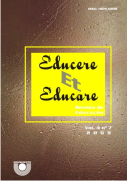POLÍTICAS DE FORMAÇÃO E FORMAÇÃO POLÍTICA: POSSIBILIDADES E DESAFIOS PARA O CURSO DE PEDAGOGIA
DOI:
https://doi.org/10.17648/educare.v6i12.5150Palavras-chave:
universidade, diretrizes curriculares, sujeito político, pedagogoResumo
A política educacional para formação de educadores no Brasil é normatizada por diretrizes curriculares e vem sendo influenciada por propostas educativas de organismos internacionais. Preocupadas com a educação para cidadania voltamos nossos estudos para a formação política do educador, mais especificamente no curso de Pedagogia. Nosso objetivo é refletir sobre a formação do pedagogo a partir da análise documental das Diretrizes Curriculares Nacionais (DCN’s) de Pedagogia, buscando articular com a possibilidade de uma formação política na universidade. Iniciamos este artigo discutindo a responsabilidade social da universidade em formar o profissional crítico e político, fundamentadas em Sobrinho (2005) e Santos (2005). O sentido da política e da ação e constituição do sujeito político foi articulado a partir do pensamento de Arendt (1998, 2008) e Novaes (2007). Essa sustentação teórica nos permitiu apresentar os resultados da análise das DCN's. O estudo indica algumas contradições que permeiam o Ensino Superior. Um dos aspectos diz respeito à fragilidade da formação política pedagógica, outro, refere-se à universidade, que mesmo instituída por normas, se produz também como sujeito coletivo instituinte.Downloads
Publicado
10-06-2011
Como Citar
OLIVEIRA, R. G. de; BORSSOI, B. L.; GENRO, M. E. H. POLÍTICAS DE FORMAÇÃO E FORMAÇÃO POLÍTICA: POSSIBILIDADES E DESAFIOS PARA O CURSO DE PEDAGOGIA. Educere et Educare, [S. l.], v. 6, n. 12, 2011. DOI: 10.17648/educare.v6i12.5150. Disponível em: https://saber.unioeste.br/index.php/educereeteducare/article/view/5150. Acesso em: 6 fev. 2026.
Edição
Seção
Núcleo Temático: Políticas para Educação Superior e Formação de Professores
Licença
Aviso de Direito Autoral Creative Commons
Política para Periódicos de Acesso Livre
Autores que publicam nesta revista concordam com os seguintes termos:
1. Autores mantém os direitos autorais e concedem à revista o direito de primeira publicação, com o trabalho simultaneamente licenciado sob a Licença Creative Commons Attribution que permite o compartilhamento do trabalho com reconhecimento da autoria e publicação inicial nesta revista.2. Autores têm autorização para assumir contratos adicionais separadamente, para distribuição não-exclusiva da versão do trabalho publicada nesta revista (ex.: publicar em repositório institucional ou como capítulo de livro), com reconhecimento de autoria e publicação inicial nesta revista.
3. Autores têm permissão e são estimulados a publicar e distribuir seu trabalho online (ex.: em repositórios institucionais ou na sua página pessoal) a qualquer ponto antes ou durante o processo editorial, já que isso pode gerar alterações produtivas, bem como aumentar o impacto e a citação do trabalho publicado (Veja O Efeito do Acesso Livre).
Licença Creative Commons
Esta obra está licenciada com uma Licença Creative Commons Atribuição-NãoComercial-CompartilhaIgual 4.0 Internacional, o que permite compartilhar, copiar, distribuir, exibir, reproduzir, a totalidade ou partes desde que não tenha objetivo comercial e sejam citados os autores e a fonte.


